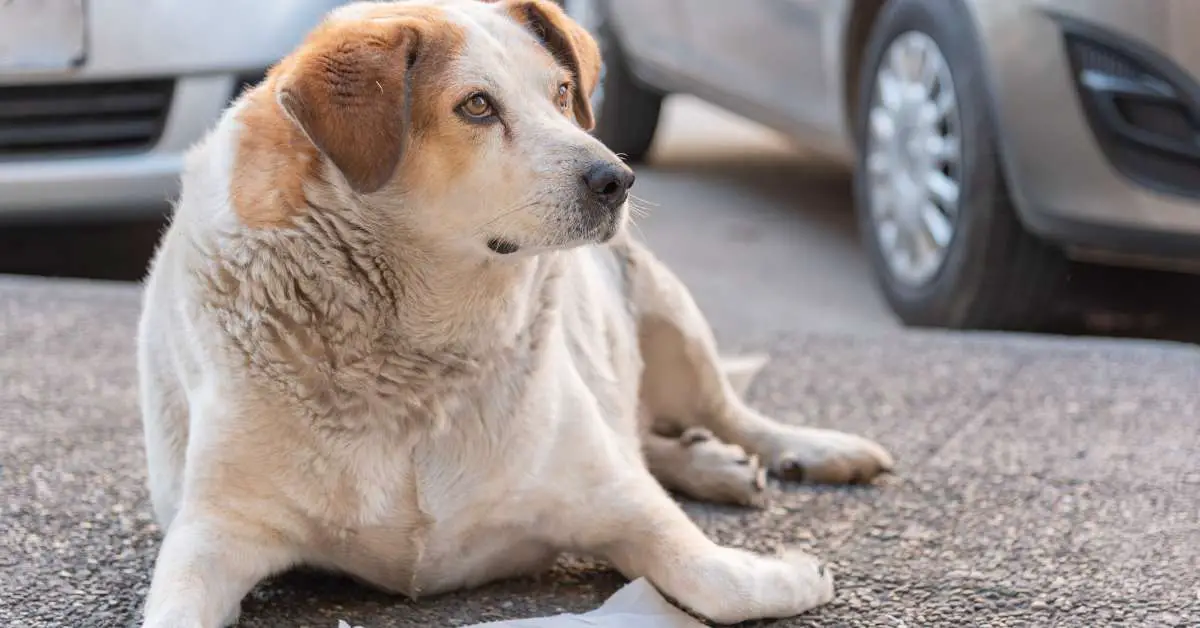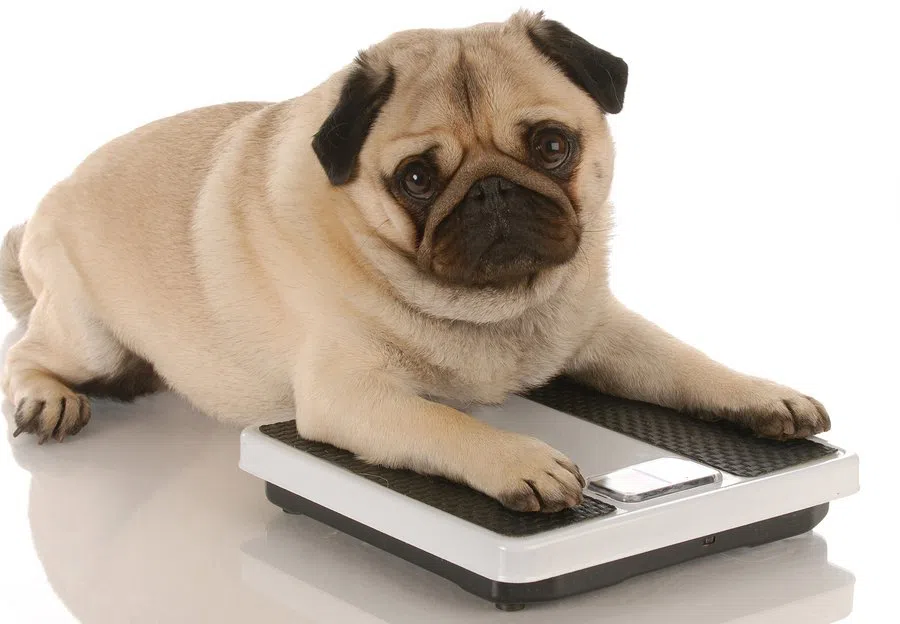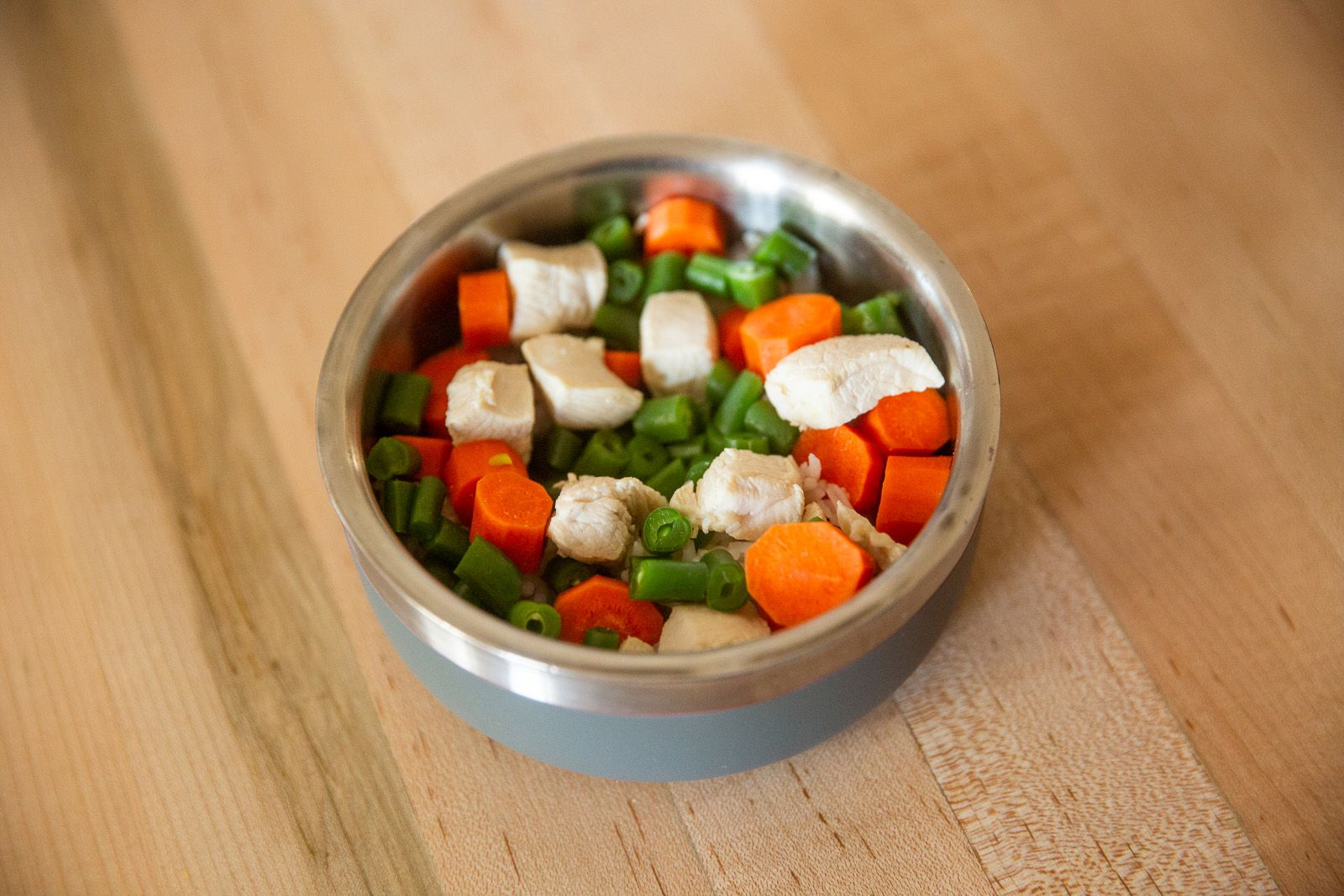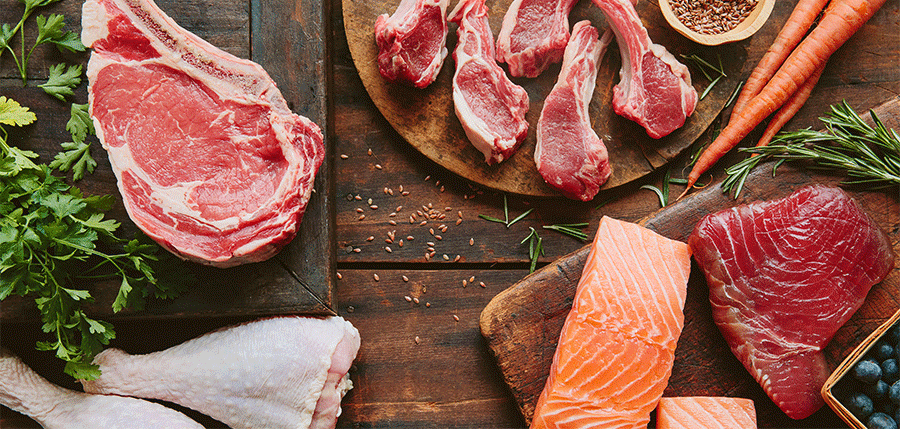What Food is Good For Dog Weight Loss – Weight Deduction Plan

In the world of pet health, a silent epidemic is spreading – dog obesity. Dog obesity is a growing concern in pet health, characterized by an excessive accumulation of body fat.
For an overweight dog, even simple activities like walking or climbing stairs can become a struggle.
Furthermore, overweight senior dogs are at a higher risk of developing serious health problems such as diabetes, heart disease, and respiratory problems.
It is crucial for owners of overweight dogs to consult with veterinarians to create a tailored weight loss plan.
This plan should include a healthy diet and regular exercise, which are essential for an overweight dog to lose weight and improve their overall health.
Key Takeaways
- Prevalence and Risks of Dog Obesity: Dog obesity is a significant health concern, with over 59% of dogs in the U.S. being overweight or obese. Obesity in dogs can lead to serious health issues like diabetes, heart disease, and decreased lifespan.
- Role of Diet in Dog Weight Loss: The right diet is crucial for weight loss in dogs. High-protein, low-carbohydrate, and high-fiber diets are recommended. Portion control and avoiding high-calorie treats are key.
- Recommended Foods for Weight Loss in Dogs: Foods rich in lean proteins (chicken, turkey, fish), fibrous vegetables (green beans, carrots, broccoli), and whole grains (brown rice, rolled oats) are ideal. Omega-3 fatty acids and multivitamin supplements can also be beneficial.
- Homemade Diet Options: Homemade dog food recipes can be tailored for weight loss, focusing on lean proteins, fibrous vegetables, and whole grains. It’s important to consult with a veterinary nutritionist to ensure nutritional balance.
What Food is good for dog weight loss
Factors contributing to dog obesity include overfeeding, lack of exercise, genetic predisposition, and certain health disorders.
It’s important for pet owners to recognize the signs of obesity, which can include noticeable weight gain, difficulty in feeling the dog’s ribs, a lack of a visible waist, and decreased activity levels.
Addressing this issue involves a combination of choosing the right dog food, regular exercise, and veterinary supervision to ensure dogs lose weight.
By maintaining a healthy weight, adult dogs can enjoy a higher quality of life and potentially avoid many obesity-related health issues.

According to Association for Pet Obesity Prevention over 59% of dogs in the United States are either overweight or obese. This startling statistic underscores the urgency of addressing this health issue head-on.
When we talk about a “healthy dog diet,” we’re not just focusing on keeping our furry friends safe for appearances; it’s about ensuring their long-term health and vitality. Effective “dog weight loss” strategies and “managing dog obesity” are now more crucial than ever.
But have you ever wondered if your beloved pet might be at risk? What steps can you take to ensure their optimal health?
Understanding Dog Obesity
Understanding the causes of obesity in dogs is the first step in combating it. Factors such as lack of “dog exercise” and poor “dog feeding habits” are primary contributors. But how do you know if your dog is overweight?
According to Pet Obesity Prevention, that’s where the body condition scoring system comes in handy. This system, which can be found on reputable veterinary websites, provides a visual and descriptive way to assess your dog’s body condition.
The health risks associated with canine obesity are not to be taken lightly. These include “dog health issues” like diabetes, heart disease, and “obesity-related illnesses in dogs,” impacting their quality of life and longevity.
The Role of Diet in Dog Weight Loss
Right dog food is pivotal in managing weight. Choosing the right food depends on the dog’s life stage and several other factors. A weight management dog food should include an appropriate mix of proteins, fats, and carbohydrates. But beware of common misconceptions about dog feeding.
For instance, pet foods that are grain-free diet isn’t always the healthier choice, and not all human foods are safe for dogs. Optimizing a dog’s weight is crucial for its overall health and well-being, and diet plays a pivotal role in this process.
According to The Kennel Club, when it comes to effective weight management in dogs, choosing the right diet is key. This involves selecting high-quality dog foods that are rich in essential nutrients but low in unnecessary calories like grain-free diets.
Dog foods for weight maintenance should include proteins, carbohydrates, and fats in the right proportions to ensure your dog gets all the necessary nutrients without excess calories.
Incorporating foods with high fiber content can also aid in weight loss by promoting a feeling of fullness and regulating digestion. Additionally, reducing portion sizes and avoiding overfeeding, especially with treats, is essential in controlling calorie intake.
Consistent monitoring of your dog’s weight and adjusting their diet accordingly is vital. Implementing a well-planned diet regimen not only helps in achieving a healthy weight but also enhances the overall quality of life for your canine companion.
Recommended Foods for Weight Loss in Dogs
Choosing the Right Food for Weight Loss
Weight loss dog food should be high in protein and low in carbohydrates. “High-protein dog foods” and “low-carb diets for dogs” are weight loss dog food.
When it comes to commercially available weight loss dog food, options like grain-free and high-fiber variants can be beneficial. But it’s crucial to understand dog food labels to ensure you’re making the best choice for your pet.
When it comes to managing weight in dogs, choosing the right food is crucial. Dog foods for weight maintenance should be rich in high-quality protein and low in fats can be beneficial. Dog foods such as lean meats like chicken, turkey, and fish are excellent choices.
Incorporating fibrous vegetables like green beans, carrots, and pumpkin can help with satiety and digestion. Also, whole grains like brown rice or barley provide essential nutrients while keeping calorie counts in check.
It’s important to avoid high-calorie treats and human food scraps which can contribute to weight gain. Portion control is also key; feeding your dog the right amount based on their size, age, and activity level is essential.
Additionally, specially formulated weight management dog foods, available commercially, are designed to provide a balanced diet while helping your dog shed excess weight.
Always consult with a veterinarian before making significant changes to your dog foods, especially if they have specific health conditions.
When searching for the best dog food for weight loss, it’s crucial to find a formula that balances nutritional needs while helping your dog shed a few pounds. The best dog food for weight loss typically includes high protein content to maintain muscle mass and low-fat dog food to reduce calorie intake to sustain healthy body weight.
Additionally, the best dog food for this purpose should be rich in fiber, as it aids in digestion and helps the dog feel full. Choosing the best dog food means also looking for added vitamins and minerals to ensure overall health is maintained while shedding a few pounds.
The best dog food for weight loss often comes with specialized ingredients like L-carnitine, which aids in fat metabolism. When selecting the best dog food for weight loss, it’s also important to consider palatability, ensuring that your dog enjoys their meals while losing weight.
Ultimately, the best dog food for weight loss is one that is formulated specifically for weight management, taking into account your dog’s size, age, and activity level. Remember, when transitioning to the best dog food for weight loss, it should be done gradually to avoid digestive upset.
Homemade Diet Options
For those who prefer a more hands-on approach, “homemade dog food recipes” can be tailored to your dog’s specific needs. Best dog food should be formulated with a veterinary nutritionist to ensure it meets all your dog’s nutritional requirements.
As an example, a balanced homemade dog food recipe might include lean meats, vegetables, and healthy grains, proportioned correctly.

Creating homemade dog food to lose weight can be a healthy and effective option, but it requires careful planning to ensure it’s nutritionally balanced. Start with lean proteins like boiled chicken, turkey, or fish, which provide essential amino acids without excess fat.
Incorporate fibrous vegetables such as green beans, carrots, and broccoli, which add volume and nutrients with minimal calories. Small portions of whole grains like brown rice or rolled oats can offer energy and fiber.
It’s important to avoid fatty meats, excessive oils, and high-calorie treats to make dogs lose weight. Portion control is crucial; feed your dog according to their ideal weight, not their current weight.
Including a source of omega-3 fatty acids, like flaxseed or fish oil, can support overall health. Also, a multivitamin supplement designed for dogs might be necessary for balanced nutrition.
Before starting a homemade diet, consult with a veterinary nutritionist to ensure the diet meets all your dog’s nutritional needs and to monitor their weight loss progress.
- Lean Proteins (Chicken, Turkey, Fish): These proteins are low in fat (lean muscle mass) and calories, making them ideal for weight loss diets. They help maintain muscle mass even as the dog loses weight, which is crucial because muscle tissue burns more calories than fat, aiding in more effective weight management.

- Fibrous Vegetables (Green Beans, Carrots, Broccoli): High in fiber and low in calories, these vegetables help create a sense of fullness, reducing the likelihood of overeating. They add bulk to the pet food without adding significant calories, helping to satisfy hunger with fewer calories.
- Whole Grains (Brown Rice, Rolled Oats): Whole-grain brown rice provides a steady source of energy without causing spikes in blood sugar levels. The high fiber content in whole grains also aids in digestion and helps maintain steady energy levels, preventing hunger pangs that can lead to overeating.
- Omega-3 Fatty Acids (Flaxseed, Fish Oil): While not directly linked to weight loss, omega-3 fatty acids can improve metabolism and overall health, which can indirectly support weight loss efforts. They also help in reducing inflammation, which can be beneficial for overweight dogs who may have joint pain or mobility issues.
- Multivitamin Supplements: These ensure that the pet food gets all the necessary nutrients without extra calories. A well-nourished body can manage weight more effectively, as nutrient deficiencies can sometimes lead to weight gain or hinder weight loss.
Grain Free diets
Grain-free dog food has become increasingly popular in recent years, driven by a trend towards more natural diets for pets and concerns about food sensitivities and food allergies.
This type of dog food excludes traditional grain ingredients like wheat, corn, and rice, often substituting them with alternative carbohydrate sources such as potatoes, peas, sweet potatoes, and legumes.
The rationale behind grain-free diets for dogs is often based on the belief that these diets are closer to a dog’s ancestral diet and that some dogs may have sensitivities or intolerances to grains.
For dogs with specific grain allergies or sensitivities, grain-free dog food can indeed be beneficial, helping to alleviate symptoms like skin irritation, digestive upset, and ear infections.
Weight loss primarily depends on feeding less calories than the dog expends. Foods for weight loss whether it is grain-free or not, must provide fewer calories than your dog’s daily requirement to promote weight loss.
Supplements and Treats
When considering supplements and treats for a dog’s weight loss journey, it’s important to choose options that contribute positively to their overall health and diet plan. For supplements, omega-3 fatty acids, commonly found in fish oil, are a great choice.
They not only enhance skin and coat health but also possess anti-inflammatory properties that can be beneficial for overweight dogs, often prone to joint issues.
A well-balanced multivitamin can ensure that the dog receives all necessary nutrients, especially if they’re on a calorie-restricted diet for healthy weight loss. Glucosamine and chondroitin supplements can also be beneficial for joint health, which is crucial for overweight dogs.
When it comes to treats, opt for low-calorie and high-fiber options. Vegetables such as carrots, cucumbers, and green beans are excellent as they are nutritious and low in calories, making them ideal for healthy weight loss.
There are also commercially available low-calorie dog treats specifically designed for weight loss, which are formulated to be satisfying without adding excessive calories.
It’s vital to remember for pet parents that treats should only constitute a small fraction of the dog’s daily caloric intake to maintain the dog’s target weight. Always avoid giving human food, especially those high in fat and sugar, as they can counteract weight loss efforts.
Consulting with a veterinarian before adding any supplements or significantly changing your dog’s diet is always advisable to ensure it aligns with their specific health needs.
Additional Weight Loss Strategies
Weight loss in dogs isn’t just about diet. According to American Kennel Club, dog exercise routines and physical activities for dogs play an essential role. Also, consider the psychological aspects of feeding – how the way you feed your dog affects their eating habits.
Regular health check-up, weight monitoring, and exercise routine is crucial in managing your dog’s weight effectively otherwise it can lead to serious health consequences.
Consulting a Veterinarian
Every dog is unique, and their dietary needs can vary. Hence, “veterinarian consultation for dog diets” and “personalized dog diet plans” are indispensable.
A veterinary nutritionist can provide “veterinary support for canine obesity” and guide you through a weight loss plan, ensuring it’s safe and effective for your specific pet.
Conclusion
In summary, Pet obesity prevention involves a comprehensive approach that includes a balanced diet, regular exercise, and professional guidance. Remember, it’s not just about the weight; it’s about your dog’s overall health and happiness.
If you’re concerned about your dog’s weight, don’t hesitate to seek professional advice and explore other informative articles on our site.
Frequently Asked Questions:
- What are the signs my dog might be overweight?
- Signs include noticeable weight gain, difficulty feeling the ribs, a lack of visible waist, and decreased activity levels.
- Can grain-free diets be good for dog weight loss?
- Grain-free diets aren’t always healthier or lower in calories. The key is balancing high-quality protein, fiber, and essential nutrients while keeping calorie content low.
- How can I ensure my dog’s weight loss diet is balanced?
- Choose dog foods formulated for weight management and consider consulting a veterinarian or a veterinary nutritionist. Incorporate a mix of lean proteins, fibrous vegetables, and whole grains.
- Is homemade dog food a good option for weight loss?
- Yes, homemade dog food can be tailored for weight loss. Ensure it’s nutritionally balanced with the right proportions of lean proteins, vegetables, and grains, and seek guidance from a veterinary nutritionist.
